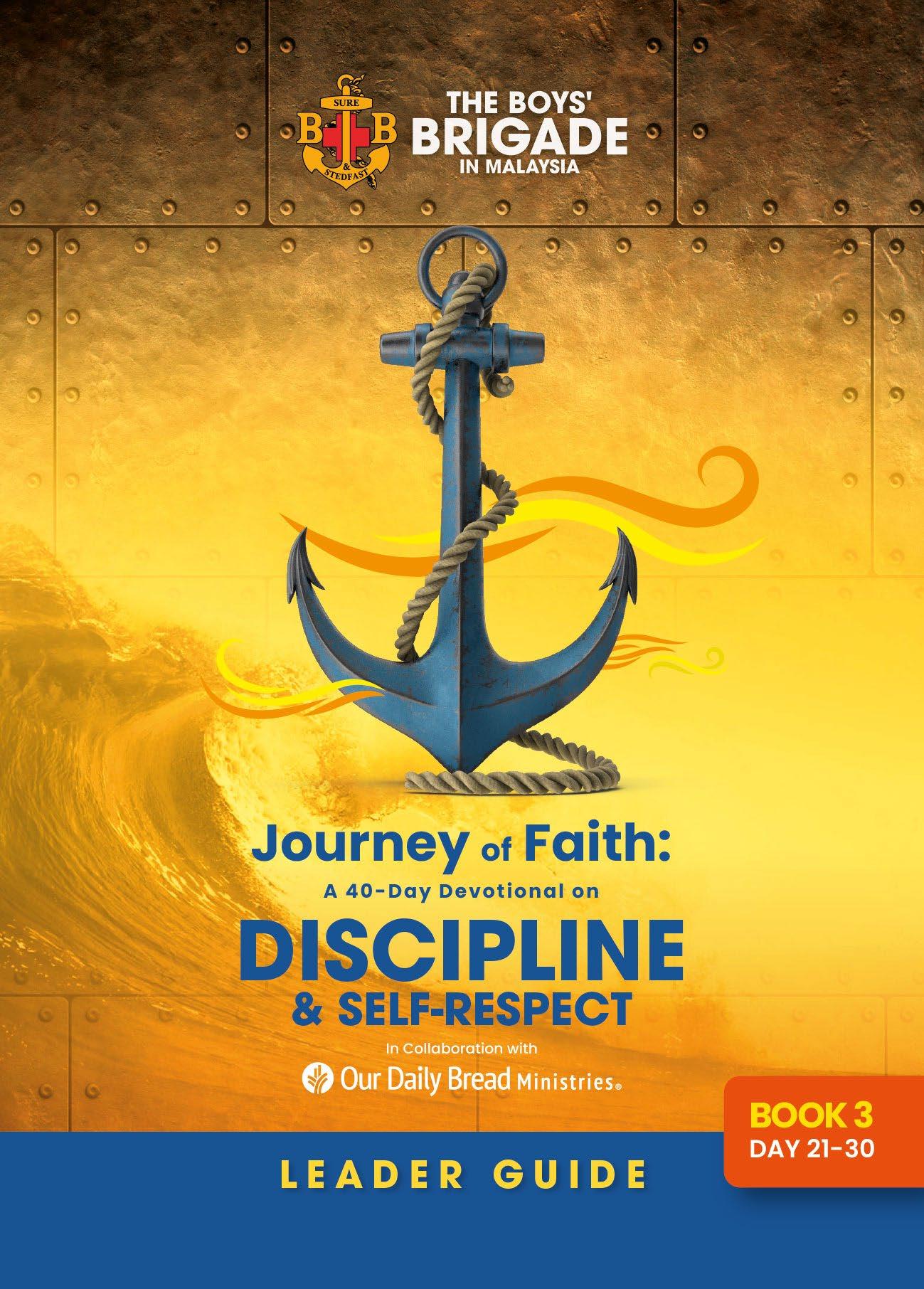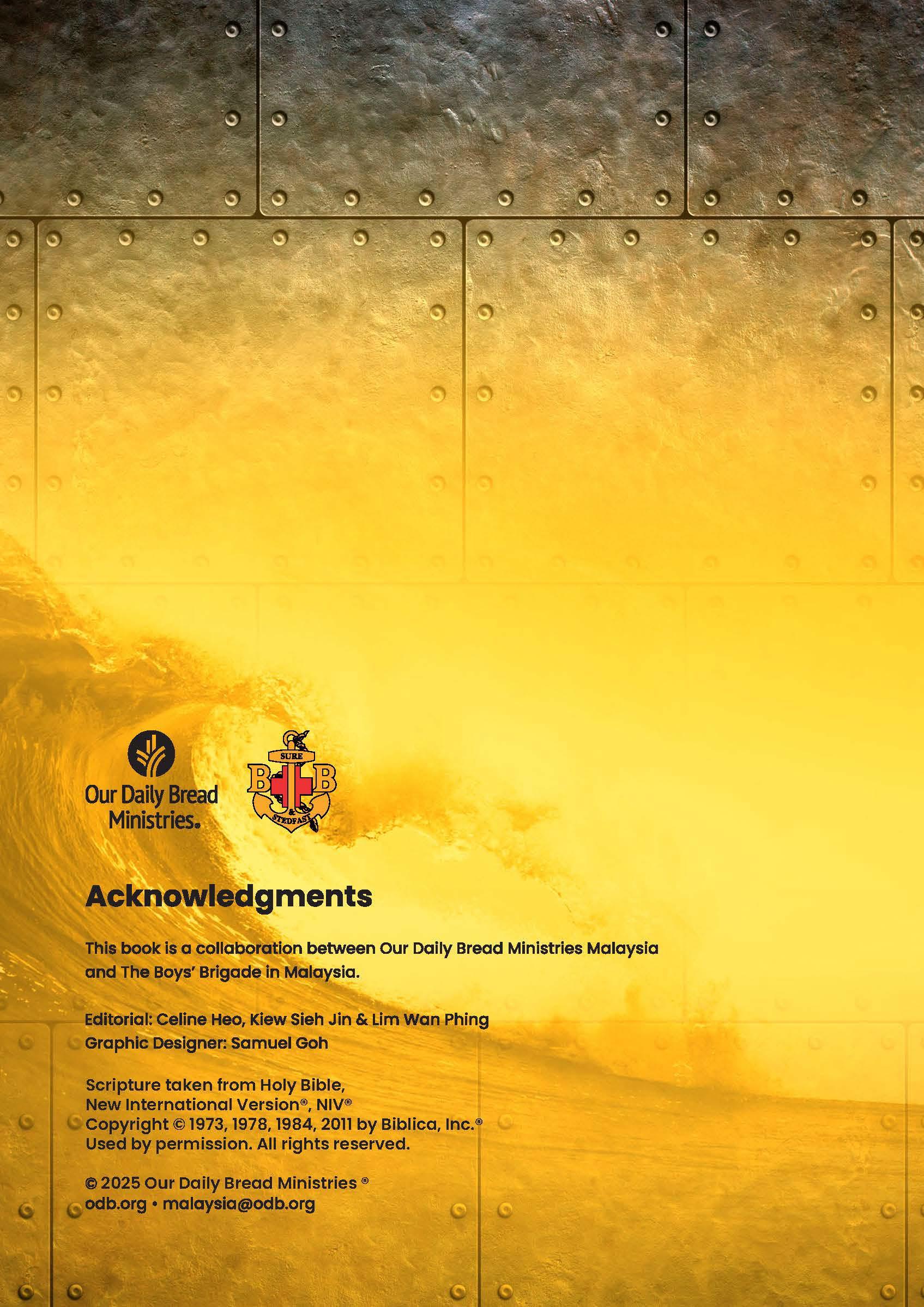






Discipline is the practice of training people to obey rules or a code of behaviour, using words and actions, warnings and consequences to keep one on track. Christian discipline involves cultivating specific habits and practices like prayer, fasting and Bible reading to help believers grow closer to God and become more like Christ.
Discipline is a key quality that shapes how we work, live, behave and relate with others. It involves managing our actions and staying committed especially when challenges arise. Discipline includes Motivation and Attitude: the motivation to improve and push oneself, and an attitude of focus, selfcontrol and professionalism in pursuing a goal.
Self-respect is pride and confidence in oneself – a feeling that one is behaving with honour and dignity. It is the foundation of how we treat ourselves and others, and how we present ourselves in the world. Self-respect, learned through Scripture, will cultivate a healthy sense of identity, self-worth and self-esteem.
Over the next 20 days of the devotional challenge, we will dive into three aspects of self-respect, namely Confidence, Compassion and Modesty. The first is about believing in oneself and one’s ability to make a positive impact. The second involves treating others with empathy and care, while the third is reflected in how we dress and present ourselves appropriately for different occasions.
Notes:
1. The duration of the devotional sessions is 20-30 minutes.
2. This leader’s guide is suitable for both online and physical discussions.
3. This leader’s guide is suitable for officers and leaders who lead a group or individuals who are not joining any of the discussion groups.
For officers or leaders who conduct the sessions in a group, keep in mind the following:
1. Have a non-judgmental attitude.
a. In the course of the discussion, some members may give answers that you, as the leader, know are wrong.
b. Don’t pounce on the answer or reprimand them – they will not want to continue participating.
c. Value the insight you are gaining into their true thoughts, so that they are able to share what they think openly rather than parroting “right answers” to you.
d. Accept the answer by saying something like, “That’s an interesting point of view. What do the rest of you think?”
2. Encourage participation.
a. Some members are chatty and assertive. Welcome their contribution but remind them to give others a chance to speak.
b. Other members are shy and quiet. Encourage them to share, but if they really don’t want to, don’t force them.
c. Try to give every member a chance to say something.
3. When summarising or concluding, highlight good answers that have been contributed and add insights from the leaders’ guide that the members may have missed.


Lesson/Learning Objective: To respect ourselves and others as God’s image-bearers out of reverence and love for Him.
Preparation:
❖ Bible verse: Esther 1:1-5, 9-12.
Context: The story of Esther occurred during the time of Judah’s restoration from exile, about 100 years after the first group of exiles were taken to Babylon. The ruler at the time was Xerxes or Ahasuerus, a king of the Persian empire. A number of Jews had returned to Judah, but the story of Esther is about the Jews who remained in Susa, the capital of the Persian Empire. Today’s reading begins by describing two lavish parties thrown by King Xerxes He then calls for Queen Vashti to be brought out and paraded before his guests. However, she refuses and he banishes her. He begins the search for a new queen, and this is where Esther’s story begins.
❖ Materials: Food, drinks
Activity:
Throw a party for your members! Order some pizza or fast food, soft drinks, get some party hats and party horns.
Today is Day 31 – just nine days more to go! Let’s celebrate!
For online, ask your members to buy food and enjoy it together on screen.
o After eating, ask: “How long was this party? Very short only, right?”
o Think about the last party you attended. How long did it take?
In today’s reading, we are going to read about some parties… But they lasted much longer than the parties we have attended before.
Discussions:
❖ Read the Bible passage and the devotional article with the participants.
❖ Discuss the three questions:
1. Q: How many parties are mentioned here, and how long did they last (v.4-5, 9)?
A: Three parties. The first was thrown by the King to show off his wealth to nobles, officials, princes, and military leaders of his vast empire. It lasted 180 days, or six months!
The second party was smaller, for the inhabitants of the King’s citadel. It lasted seven days. The third party was even smaller, held by Queen Vashti for women in the royal palace. The duration is not stated, but since it ran concurrently with the second party, it was probably seven days
2. Q: Why did the King summon Queen Vashti, and why did she refuse to appear before him (v.11-12)?
A: The King threw these parties to show off his great power and wealth. Now he wanted to show off his beautiful queen, to display her like an object instead of a fellow human being with royal dignity. The text does not explain why Vashti refused, but traditional Jewish sources suggest she was ordered to parade nude. What’s certain is that it was likely degrading and disrespectful, as the king and his guests were very drunk when he gave the command (v.10).
3. Q: What thoughts or actions can you change to treat others with dignity and respect?
A: Let your members reflect, but you may give examples like helping someone for a reward Having an ulterior motive is insincere and manipulative. Instead, we should do it out of kindness and in obedience to Jesus’ command to love one another. When we embody selfrespect (which includes helping others in obedience to Christ), we cultivate a healthy sense of worth and contribute to a more positive, compassionate environment around us.
Another example is the struggle with lust and pornography Generally, porn depicts women as less than men, and as sexual objects for men’s pleasure. Understand that God created men and women to be equals, both bearing His image (Genesis 1:26-27). Remember that porn actresses are human beings; they are someone’s daughter, mother, sister or wife.
Conclusion:
Memorise Genesis 1:27 together: “So God created mankind in his own image, in the image of God he created them; male and female he created them.”
Remind your members that human beings are eternal spirits, who will live longer than the world’s powerful empires ie. Assyrian (2,000 years), Babylonian (1,500 years), Persian empire (today’s reading, 200+ years), Roman (1,000 years) etc.
Share this C.S. Lewis quote:
“There are no ordinary people. You have never talked to a mere mortal. Nations, cultures, arts, civilizations – these are mortal, and their life is to ours as the life of a gnat. But it is immortals whom we joke with, work with, marry, snub, and exploit –immortal horrors or everlasting splendours.”
Close in prayer Ask God to help us understand we’re created in His image and treat others with respect out of reverence for Him.


Lesson/Learning Objective: To keep growing in Christlikeness as a form of self-respect.
Preparation:
❖ Bible verse: Ephesians 4:20-32
Context: For the context of Ephesians, see Day 3. Before today’s passage, Paul described the old self as futile in thought, darkened in understanding, hardened in heart, and given over to sensuality (4:17-19). In today’s passage, he describes it as being rotten and spoiled by deceitful desires (v.22). The Ephesians are to put off this old self and instead, integrate their new selves to be righteous and holy like God. This new self includes truth-telling, timely emotional regulation, honest work, generosity, encouraging words, kindness, compassion, and forgiveness.
❖ Materials: Device with internet and/or a guitar.
Activity:
Sing this song with your members: (1077) 04/08/2021 Be Kind to One Another (Ephesians 4:32) - YouTube
Today’s reading includes this verse. Let’s read it together.
Discussions:
❖ Read the Bible passage and the devotional article with the participants.
❖ Discuss the three questions:
1. Q: On Day 3 we discussed some practical ways to “put off” the old life and “put on” the new life. Share the actions taken, the experience and results.
A: In Day 3 we mentioned learning about Jesus; renewing our minds through meditating on God’s Word; attending Church regularly; participating in Church YF, School CF, and/or BB activities; completing this 40-day challenge (almost there!); reading the Bible and praying 5-10 minutes daily or on alternate days. Let your members share their struggles and gains. Encourage them to keep going strong for the remaining 8 days of this 40-day challenge, and after that as well!
2. Q: List three positive and three negative commands from v.25-32.
A:
Positive commands
• Speak truthfully (v.25)
• Do useful work (v.28)
Negative commands
• Don’t lie (v.25)
• When you’re angry, don’t sin (v.26)
• Share with those in need (v.28)
• Say things that build others up and benefit them (v.29)
• Be kind and compassionate to one another (v.32)
• Forgive one another like Jesus forgave us (v.32)
• Don’t hold grudges and give the devil a foothold (v.26-27)
• Don’t steal (v.28)
• Don’t say unwholesome things (v.29)
• Don’t grieve the Holy Spirit (v.30)
• Get rid of bitterness, rage, anger, brawling, slander, and malice (v.31)
3. Q: Choose 1-2 things above to work on this week. Give specific ideas on how to practise them
A: Most are self-explanatory and easy to understand. However, you could discuss:
(i) Forgiveness Forgiving is not forgetting, excusing the wrong, tolerating further abuse, or giving the offender a “free pass” to escape consequences of their actions (see Matthew 18:15-17) Forgiveness is a choice in our hearts to not hold bitterness or hatred against the offender. We may choose to distance ourselves for safety reasons, or seek justice for the victim’s good, but it is not done out of revenge. Forgiveness is choosing to let go of hurt and anger, allow God to heal our hearts, and let Him or the justice system deal with the person.
(ii) Dealing with anger. Anger is not sinful in itself, however, it’s a strong emotion that can cause us to lose control, leading us to sin. Therefore, we have to be extra careful with our words and actions when angry The devil can use strong negative emotions to disturb and oppress us. Bring anger before God and ask Him for guidance to solve the issue, and to protect us from the devil’s tricks. Don’t let negative emotions drag on and put a limit on them.
(iii) Unwholesome talk. This includes swearing, dirty jokes and sarcastic insults.
(iv) Grieving the Holy Spirit: The Holy Spirit is a person with emotions, and He can be grieved. One of the Spirit’s jobs is to convict us of sin (John 16:8) and quicken our conscience to clearly discern right and wrong (Hebrews 9:14). We grieve the Spirit when we ignore His promptings and keep going against our consciences.
Conclusion:
Encourage your members to take practical actions from Question 3 and give a short report next week
❖ Close in prayer.

Lesson/Learning Objective: To care for others as He does because showing compassion is also a form of self-respect.
Preparation:
❖ Bible verse: Psalm 8.
Context: For the context of Psalm 8, see Day 28
❖ Materials: Canva.com, YouTube or Spotify music playlist, and encouraging Bible verses.
Activity:
Ask the group: “Who in your life could really use some care or encouragement right now? How might God want you to care for them?”
They can choose to create a virtual care package for them, like:
o A digital note or e-card: Use Canva or other online design tools to create a personalised e-card or message of encouragement.
o A playlist: Create a playlist of songs that reflect God’s love and share it with someone.
o Bible verses: Select a few Bible verses that encourage others and send them in a group message or in a personal email.
Ask the teens to share their designs and why they decided to send them to specific people.
If they feel comfortable, invite them to post their creations or stories in the group chat to inspire others.
Today, let’s learn to show compassion to one another.
Discussions:
❖ Read the Bible passage and the devotional article with the participants.
❖ Discuss the three questions:
1. Q: On Day 28 we discussed Psalm 8’s view of humanity, view of ourselves and care for the environment. How have you progressed in these three areas?
A: Hopefully members now have a more balanced view of humanity Reading the news, Reddit or social media full of sad stories may lead to pessimism. Indeed, humanity is broken but Psalm 8 reminds us that we still bear God’s image
Hopefully members have improved in their self-image. Ask them to share if they struggled with self-esteem and confidence before. Encourage those who are still struggling. Lastly, ask members to share about their efforts in being responsible stewards of the environment and caring for God’s world.
2. Q: What can we learn from Psalm 8:2?
A: Firstly, we learn that the praise of children is special. Jesus said that the Kingdom of God belongs to those with childlike hearts (Luke 18:16), whose pure-heartedness and innocence makes their praise especially powerful in the spiritual realm. As “older children”, members should do likewise and worship God in spirit and in truth (John 4:24) and pray for their friends, families, schools and cities.
Secondly, we learn that God works in mysterious and upside-down ways. No-one would expect that a child’s praise could make a difference to big world issues like war or injustice. Somehow, God uses what seems weak and useless to win victories and work out His will in the world (1 Corinthians 1:27-29).
Thirdly, we learn that true strength comes from depending on God. The act of praising God acknowledges Him as our Lord and King, the one on whom we trust. When we depend on God like helpless babies who cry for milk, He becomes our stronghold and refuge against the enemy.
3. Q: Verses 5-8 talks about God’s view of humanity. How can we apply this to our view of others, especially people we dislike?
A: As pointed out by the devotional article, every person that we interact with in our lives is highly valued by God, worth more than the costliest diamond in the universe. This is true even for people we hate. In view of this, can we change our attitudes, be less hostile, more caring or empathetic towards “horrible” people?
This applies to racism and sexism, especially if members’ parents pass on their prejudice to their children. Help them see that all races and both genders are equally valuable in God’s eyes. A note on LGBTQ genders: we may not agree with their views, but keep in mind that often they’re going through inner turmoil and face bullying. As Christians, we should treat them with love and empathy, and pray that they may know Jesus, who will guide them on the righteous path.
Also encourage your members to look out for the misfits, loners and outcasts. Be kind and polite to those who are poorer. Jesus does not only love the upper-middle-class people who tend to be in our social circles, but also the rubbish collectors, janitors, gardeners, beggars and so on.
Conclusion:
Encourage your members to:
Keep letting God’s Word change their views of humanity, themselves, and others.
Take practical steps to live out those transformed views in their daily lives.
Grow and mature in worship, prayer, and spiritual warfare.
Trust and depend on God and His mysterious, upside-down ways, especially when going through tough times.
❖ Close in prayer.


Lesson/Learning Objective: To place our confidence not in the flesh but in Jesus alone, as a biblical way of practising self-respect.
Preparation:
❖ Bible verse: Philippians 3:2-8
Context: For the context of Philippians, see Day 4. In today’s passage, Paul speaks out against the Judaizers, a group within the church consisting of Jewish Christians who taught that Christians still had to be circumcised and obey the law of Moses to be saved (v.1-4). Paul writes that our faith should be in Jesus, not in our ethnic lineage or our ability to keep the law, even though on both counts he has an excellent record. In fact, he now considers these things – his circumcision, lineage, education, zeal, and lawfulness – rubbish compared to knowing Jesus.
❖ Materials: None.
Activity:
Get all your members to sit in a circle.
Taking turns, each person is to make a statement about something they’re confident of and then prove it.
o This may be physical: “I am confident that I can do 10 push-ups ”
o It may be intellectual: “I am confident that I can list all 27 books in the New Testament.”
o It may be a skill: “I am confident that I can play this song on the guitar.”
In today’s passage, Paul writes about what or who we should put our confidence in. Let’s read it together.
Discussions:
❖ Read the Bible passage and the devotional article with the participants.
❖ Discuss the three questions:
1. Q: What does it mean to put our confidence in the flesh (v.4-6)?
A: ‘Flesh’ here means physical or worldly achievements, such as our abilities or family background. For Paul, it meant his circumcision (a mark that he belonged to God’s chosen people, see Genesis 17:9-14); his tribe and ethnicity (Benjaminite, Israelite, Pharisee); his zeal for God, and almost-perfect record of keeping God’s laws. In today’s terms, it could be our family background, parents’ wealth, academic results, musical talents, sporting achievements, charms, good looks etc.
2. Q: Who or what should we put our confidence in, as the biblical way to practice self-respect (v.3, 7-8)?
A: We should put our confidence in Jesus and boast in Him alone (v.3). Our strengths, intelligence, abilities or skills, should instead be surrendered to Jesus. He is our greatest treasure, and we should “consider everything a loss” (v.8) and be willing to give them all up to gain Him
This is a difficult thing to do, but be assured that we’ll eventually have to give up worldly things as time goes by Physical strength diminishes with age, intelligence can be lost from disease, our loved ones will die. Knowing Jesus, though, is of greatest value and it can never be taken from us.
3. Q: What have you been putting your confidence in and how can you change?
A: Let your members share honestly. Assure them that it’s natural and human to put their confidence in themselves, but God’s Word shows us a better way. One good opportunity is when they’re facing competitions or exams. Study hard but ultimately choose to depend on Jesus for the outcome. This is a way to practise putting confidence in Him alone and to glorify Him.
Another opportunity is when they get good results as it’s the best time to point to Jesus. Be careful, though, not to misuse phrases like “Oh, all glory to God” in false humility It will take effort and perseverance to put confidence in God alone but encourage them not to give up if they revert to old habits of self-pride. Encourage them to “recalibrate” back to Jesus until it becomes part of them.
Conclusion:
End with this song featuring today’s passage: https://www.youtube.com/watch?v=4r8XfE_VNb0. Let members express their commitment to no longer put their confidence in the flesh but in Jesus alone.
❖ Close in prayer


Lesson/Learning Objective: To know Jesus’ love and acceptance for us, and extend the same to others, as showing compassion is a form of self-respect (see “Definition” page).
Preparation:
Bible verse: John 8:2-11.
Context: Today’s passage is unique in the book of John. Notice that in your Bible, it's formatted differently, with a note that early manuscripts do not include these verses or have them in a different place. This means that this passage wasn’t originally written by John. But don’t worry, we can be confident that it is an authentic story about Jesus. The story remains in our Bible today because it is trustworthy, powerful, and shows us an important facet of who Jesus is.
Materials: Sand, mahjong paper.
Activity:
Divide members into groups of 3-5 people. Give each group a small bucket of sand.
To avoid mess, you may do this activity outside or lay the floor with mahjong paper.
Tell them to make a sandcastle, sand sculpture, or sand art.
Take 5 minutes to discuss, 5 minutes to create, then 5 minutes to present.
For online, ask members to google sand sculpture images and share their screen.
In today’s passage, Jesus bent down and made sand art, writing on the ground with his finger! Let’s read it together.
Discussions:
Read the Bible passage and the devotional article with the participants.
Discuss the three questions:
1. Q: What is missing from this situation that makes it unfair and an obvious trap for Jesus (v.35)?
A: The man is missing. Adultery is not a sin that one person can commit on their own. The woman had been caught in adultery, so how was it that the guilty man had not been caught as well? Leviticus 20:10 and Deuteronomy 22:22 clearly state that both the man and the woman who commit adultery deserve the death penalty, and yet the Pharisees and teachers of the Law said, “In the Law, Moses commanded us to stone such women” (v.5). This was an obvious distortion of the law; it reveals to us that this is a setup, the woman is being victimised, and it was wrong and unfair.
2. Q: Why did Jesus write on the ground? What might He have written (v.3, 7-8)?
A: One reason the devotional provides is to take the attention off the woman. Since she was caught in the act, she may not have been fully dressed. But with Jesus stooping down to write on the ground, they would be focused on Him and not her. Thus, Jesus’s action restored some of her dignity and self-respect.
The text does not say what Jesus wrote on the ground, but a best guess could be that He wrote down points of the Law. Since He said, “Let any one of you who is without sin be the first to throw a stone at her,” (v.7), it could be the Word of God written on the sand to convict every member of the crowd of their sin.
3. Q: Observe what Jesus said to the woman (v.10-11). What does that tell you about His heart towards us and how we should view others?
A: Jesus declared to her, “Then neither do I condemn you” (v.11). Of all the men who had surrounded her, Jesus alone was sinless; Jesus alone had the right, according to the criteria he had set, to throw the first stone at her. But He did not.
If Jesus did not condemn her, we can be sure that He will not condemn us either no matter how dark and terrible our sin may seem to us. If we come to Him with regret and repentance, He will not condemn us (Isaiah 42:3, Romans 8:1).
While Jesus didn’t condemn her, neither did he condone her wrongdoing. His next words to her were, “Go now and leave your life of sin.” Jesus loves and accepts us just as we are, but He loves us too much to leave us that way.
In our dealings with others, we should try our best to treat them like Jesus treats us. We should try out best not to judge or condemn others yet challenge them to be the best possible version of themselves, with Jesus’s help.
Conclusion:
Ask members to think of one person who always seems to be judged, disliked, or left out. What can they do to extend Jesus’s nonjudgmental love and acceptance?
Close in prayer


Lesson/Learning Objective: To show compassion through leading by example and serving others with humility as Jesus did.
Preparation:
Bible verse: John 13:3-17.
Context: Today’s passage is part of the passion narrative, the story of Jesus’s last few days on earth before He went to the Cross. The setting is the night of the Last Supper, Jesus’s final meal with His disciples. In today’s passage, Jesus washes His disciples’ feet, giving them an example of true humility and servant leadership (v.1-17). After today’s passage, Jesus predicts that Judas Iscariot, one of his closest friends and followers, would betray Him. Jesus was not taken by surprise at this betrayal; He knew what Judas was planning, and yet He washed His betrayer’s feet.
Materials: Basins or buckets of water, clean rags.
Activity:
Prepare a bucket of water for yourself and one each for leaders helping ie. lieutenants, squad leaders, NCO’s.
Get your members to sit in a circle as you and your leaders wash their feet. Make sure that all member’s feet are washed. Once done, leaders can also wash each other's feet.
It might be a bit awkward as foot-washing is not something we normally do for others. But explain that this is a symbolic act of Jesus’s example to serve one another.
In today’s passage, Jesus washed His disciples’ feet. Let’s read it together.
Discussions:
Read the Bible passage and the devotional article with the participants.
Discuss the three questions:
1. Q: What does v.3 tell us about why and how Jesus washed His disciples’ feet?
A: Jesus acted from a position of strength and authority; He knew that God had put all things under His power. He could humble Himself because He was secure in His identity and the role that He was called to play in God’s plan.
Human leaders often boss, bully or make unreasonable demands out of fear and insecurity. Doing so makes them feel powerful, and they become addicted to and corrupted by their abuse of power. Jesus displays an opposite model of leadership: He can humble Himself because He doesn’t have anything to prove and has no one to impress or oppress. He can simply serve by example.
2. Q: Why did Peter refuse to let Jesus wash his feet (v.8)?
A: You can expect your members to also react like Peter ie. feeling embarrassed or awkward. However, explain the historical context that in Jesus’ day, people walked everywhere, and only the rich had horses or donkeys. Roads weren’t tarred, so feet became dusty, sweaty and smelly. Because of this, feet washing was done by the lowest of the lowest in society, like menial servants or slaves.
So imagine how shocking it was for the disciples’ teacher, master and Lord to wash their feet like a lowly servant! Especially after they’ve seen Him preach to thousands, heal the sick, cast out demons and raise the dead. Peter initially could not accept the idea due to the mindblowing contrast between his perception of Jesus and what Jesus was doing.
3. Q: What should we do to serve others humbly?
A: Jesus told us to follow His example and to wash each other’s feet (v.14, 17). Think about the boring and unpleasant jobs in your home, school or church that no one wants to do. To lead like Jesus is to be willing to do those jobs and work alongside your subordinates rather than ordering them to do it.
Following Jesus’s example also means we should be secure in our identity as beloved children of God and love those we lead. We are to lead without pride, selfishness, or competitiveness, with no need to elevate ourselves, suppress others, or plot to have our own way. We will be comfortable with letting others shine, loving and serving them with humility.
Conclusion:
Ask your members to think of one way they can follow Jesus’s example of servant leadership in the coming week, and to do it.
❖ Close in prayer


Lesson/Learning Objective: To change the way we speak and the words we choose so that we’ll glorify God with our tongues and treat others right.
Preparation:
Bible verse: James 3:7-12.
Context: James writes about the power of the tongue to cause great harm, sometimes with eternal consequences even though it’s just a small part of the body. In today’s passage, he calls the tongue untameable and capable of great evil (v.7-8). He then argues that as Christians, our tongues should be used to praise God and not to curse human beings (v.9-12). After today’s passage, James contrasts earthly “wisdom,” which is bitter envy and selfish ambition, with heavenly wisdom, which is pure, peace-loving, considerate, submissive, merciful, good, impartial, and sincere.
Materials: None.
Activity:
How long is the average human tongue? Ask members to guess the length.
The average for men is 8.5 cm, and for women it’s 7.9 cm (Source: https://www.healthline.com/health/how-long-is-the-human-tongue).
Congratulate those whose guesses were nearest the correct answer.
Today’s passage says that even though the tongue is so small (only 5% of our height), it can have a very big impact on our lives. Let’s read it together.
Discussions:
Read the Bible passage and the devotional article with the participants.
Discuss the three questions:
1. Q: What does James write about the tongue in v.7-8? Why does he write this?
A: James writes that the tongue is untameable. He describes it as, “a restless evil, full of deadly poison” (v.8). You may ask members to share if they’ve been hurt by harsh words in the past and discuss if James’ description of the tongue is too extreme. The reason for James’ words, however, is that the tongue is evil because of our sinful hearts.
Jesus said in Matthew 12:34, “For the mouth speaks what the heart is full of” and the human heart can be full of bitterness, anger, hatred and pride. Therefore, the tongue’s problem is a heart problem. We don’t have the power to change our own hearts, and we need God to give us new ones (Ezekiel 36:26).
2. Q: Why shouldn’t we curse and swear at others (v.9-12)?
A: Human beings are created in the image of God (Genesis 1:27). Therefore, insulting another human being is indirectly insulting God Himself. There is also inconsistency between praising God and cursing His creation (v.9-12) with the same mouth. This lacks integrity, as the tongue shouldn’t be doing two opposite things. If our praise and love for God is genuine, it should also impact the way we see others.
3. Q: On a scale of 1 to 10, 1 being “restless evil” and 10 being “almost perfect”, how would you evaluate your tongue? How would you improve with God’s help?
A: Give your members some time to think and share their thoughts. Point them also to today’s “Reflect and Pray” section and ask the Holy Spirit to reveal the truth about themselves. Personally, I stopped swearing (or greatly reduced it) when the Holy Spirit convicted me after I read these verses. Your members may behave in front of adults but drop f-bombs when talking to friends. The change we’re looking for today is a personal choice to obey God, out of a genuine desire to glorify Him.
Conclusion:
Commend your members for doing the hard work of self-evaluation. Encourage them to followthrough on their commitment to obey and glorify God with their tongues.
❖ Close in prayer.



Lesson/Learning Objective: To speak gentle, knowledgeable and life-giving words so that we make a positive impact on others.
Preparation:
Bible verse: Proverbs 15:1-9.
Context: Today’s passage is part of a long series of proverbs written or compiled by Solomon. Proverbs are short, stand-alone statements containing wisdom and general moral truths. Each verse in today’s passage contains a proverb, and more than half of them have to do with the tongue or speech (v.1, 2, 4, 7, and 8).
Materials: English proverbs and Malay peribahasa.
Activity:
Can you match these English proverbs with their equivalent Malay peribahasa?
Yang dikejar tak dapat, yang dikendong berciciran
Biar lambat asal selamat
Air dicincang tak akan putus
Ukur baju di badan sendiri
Tong yang kosonglah yang
selalu berkocak
Sambil menyelam minum air
Bapa borek, anak rintik
Ringan sama dijinjing, berat sama dipikul

Cut your coat according to your cloth



Blood is thicker than water
Many hands make light work
A bird in the hand is worth two in the bush

Like father, like son



Better late than never
Kill two birds with one stone
Empty vessels make the most noise
Each of these proverbs contains wisdom about the world as understood by the English and Malay cultures.
In the Bible, there are also proverbs like these and we’ve seen some in Day 27.
While these proverbs are a valuable product of human experience, Biblical proverbs are even greater as they contain God’s truth and wisdom.
Today’s passage contains nine of these Biblical proverbs. Let’s read it together.
Discussions:
Read the Bible passage and the devotional article with the participants.
Discuss the three questions:
1. Q: What repeated themes arise through these nine proverbs?
A: More than half (five out of nine) of these proverbs are about the tongue or speech. They are verses 1, 2, 4, 7 and 8. In particular, verse 8 says that God will reject the external rituals of worship by a wicked person, but He will accept the prayer – which are words spoken to God –of a righteous person.
One repeated theme is the contrast between the wicked and the righteous. God watches over both, but the righteous person generally ends up better off in terms of their finances, God’s acceptance of their worship, and God’s love for them. Another theme is the contrast between the fool and the wise man in terms of their words (v.2, 7), and their ability to accept correction and discipline (v.5).
2. Q: Do you tend to speak gentle or harsh words?
A: Give your members a few minutes to reflect on the contrasting pairs of gentle vs. harsh, lifegiving vs. spirit-crushing, etc. Ask them to share how they’ve been speaking and what they’re struggling with. Be encouraging and non-judgmental.
3. Q: From today’s devotional article, “When have you seen careless words cause damage? How can you show God’s compassion through what you say?”
A: For the first question, it could be their personal experience or about someone they know. For the second question, the devotional article gives us this clue: “We find wisdom by drawing close to God, the source of wisdom’s life-giving power.” Therefore, encourage your members to:
(i) Draw close to God in prayer, worship and Bible reading. We must know God’s compassion intimately before we can show it to others. We can’t give something we don’t have.
(ii) Submit their thoughts and speech to God. Ask God to consecrate their mouths and tongues, to help them articulate their feelings and thoughts, and to speak words of life.
(iii) Learn to pause and filter before speaking. As James 1:19 says, “…everyone should be quick to listen, slow to speak and slow to become angry…” It is better to take a few seconds to pause and make sure what we’re about to say is good, right and true, rather than blurting out the first thing that comes to mind.
There could be many answers, so listen to what members share. Accept any which are good. When necessary, help them process their thoughts further so that answers are not vague or template, but genuine, specific, and doable.
Conclusion:
End with this song for members to renew their commitment to consecrate their lives to Jesus: https://www.youtube.com/watch?v=agROj9nTQP4.
Emphasise the third verse: Take my voice and let me sing / Always, only for my King. Take my lips and let them be / Filled with messages from Thee.
❖ Close in prayer

Lesson/Learning Objective: To see how much we have gained from knowing Jesus, and how we should grow as a result.
Preparation:
❖ Bible verse: Philippians 2:1-5.
Context: For the context of Philippians, see Day 4. In today’s passage, Paul lists down some benefits of knowing and following Jesus – encouragement, comfort, common sharing, tenderness, and compassion – and uses them as leverage to motivate the Philippians to be united in thought, love and spirit (v.1-2). He calls them to discard selfish ambition and vain conceit and sets before them the example of Jesus Himself (v.5). They are to be united in humility and selflessness because all of them are walking in His steps, and He is the most humble and selfless One of all.
❖ Materials: Pen and paper.
Activity:
How many ways can you complete the sentence, “If you… then you…”? See how many you can write in one minute!
Examples include: “If you are hungry, then you should eat something,” “If you study hard, then you will get good results,” and so on.
If doing this in a group, compete to see who can generate the most answers (you may exclude answers that don’t make logical sense). If doing it alone, challenge yourself to write as many as possible.
In today’s devotional reading, Paul gives us a few “If you… then you…” statements. Let’s read it together.
Discussions:
❖ Read the Bible passage and the devotional article with the participants.
❖ Discuss the three questions:
1. Q: What are the “if…” conditions that Paul lists out (v.1-2)?
A: Paul lists out:
Encouragement from their union with Christ
Comfort from Christ’s love
Common sharing in the Spirit
Tenderness
Compassion
2. Q: What are the “…then” results that Paul thinks should flow logically from the conditions he listed out (v.2-5)?
A: If the conditions in Question 1 are met, then the results should be that they: Are like-minded
Have the same love
Are one in spirit and mind
Not motivated by selfish ambition or vain conceit
Are humble
Value others above themselves
Look to the interests of others in addition to their own
Interact with one another while adopting Jesus’s mindset of downward mobility and selfsacrifice
3. Q: Share if you’ve experienced the benefits listed in Question 1. Has it resulted in the qualities listed in Question 2, and if not, how can you make that happen?
A: Let your members reflect on how they’ve experienced encouragement, comfort, common sharing, tenderness, and compassion as a result of knowing Jesus. Ask them to share if that has led them to be more like-minded, loving, humble, etc. Explain that this is the logical process of spiritual development.
For the last part of the question, encourage members to pick one or two qualities listed in Question 2 to work on. One or two is enough so that it’s targeted, specific and achievable. Also, encourage them to give constructive suggestions to help each other improve in these areas.
Conclusion:
Ask your members to create short and snappy slogans from Question 3 to memorise and apply throughout the week. Examples are “Be like-minded,” “Have the same love,” “No selfish ambition,” “No vain conceit,” and so on.
❖ Close in prayer.


Lesson/Learning Objective: To change the way we carry ourselves in line with biblical ideals of modesty and propriety.
Preparation:
Bible verse: 1 Timothy 2:8-10.
Context: 1 Timothy, 2 Timothy and Titus are grouped together as the Pastoral Letters. All three were written by Paul to encourage and advise Timothy and Titus, who were young pastors and leaders of the fledgeling church. In today’s passage, Paul advocates for prayer, targeting the men (v.8) and then addresses the women, calling the latter to dress modestly and be more focused on doing good deeds than cultivating physical beauty, which is only skin deep (v.10).
Materials: Device with internet, speakers
Activity:
Let your members listen to this song: https://www.youtube.com/watch?v=UX5hTj5mpnw
What are some standards of beauty or handsomeness for guys and girls today? Are they reasonable? (ie. “Must be skinny,” but does not consider bulimia if taken to the extreme, or “Must have fair skin” but doesn’t consider race etc.)
Today’s reading has something to say about beauty. Let’s read it together.
Discussions:
Read the Bible passage and the devotional article with the participants.
Discuss the three questions:
1. Q: What are Paul’s instructions to Timothy with regards to men in the church (v.8)? What could be his reasons for saying so?
A: Continuing from Chapter 2:1-7 before today’s passage where Paul advocates for prayer, he writes that he wants the men everywhere to pray. One possible reason could be that generally men are more practical and hands on; they want to do the work and solve problems rather than pray. Therefore, they need to be given that extra motivation to do it.
Another possible reason is because husbands are called to be heads of their households (Ephesians 5:23). As such, they have a position of spiritual leadership and have a responsibility to defend and protect the family in prayer. As the heads, they are to set a good example to other family members on praying.
Another reason that Paul wants them to pray “without anger or disputing” (v.8) could be because some men are hot-headed and prone to conflict, whether verbal or physical. Paul
wants to redirect this warrior spirit to fight in the spiritual realm “against the spiritual forces of evil in the heavenly realms” (Ephesians 6:12).
2. Q: What are Paul’s instructions to Timothy with regards to women in the church (v.9-10)? What could be his reasons for saying so?
A: Paul writes that women should be dressed modestly, decently, and properly, focusing less on outward beauty and more on doing what is right and good. Generally speaking, women pay more attention to beauty, clothes and accessories. Of course, there are exceptions, but Paul’s words are more relevant towards women on dressing modestly rather than to impress or flaunt their assets.
We may refer to Proverbs 31:30: “Charm is deceptive, and beauty is fleeting; but a woman who fears the LORD is to be praised.” Certainly, beauty is a good thing, as seen in nature for example. God is the greatest artist and craftsman, creating a universe bursting with colours, glory and majesty.
Yet, as Proverbs says, for human beings, beauty is fleeting. Within a few decades our hairs turn white, our skin becomes wrinkly, our strong muscles go slack. It is best, then, for us to invest our time and effort into something more lasting as 2 Corinthians 4:18 says, “what is seen is temporary, but what is unseen is eternal.”
3. Q: Of the two instructions Paul gives – to lift up holy hands in prayer, and to dress modestly and adorn ourselves with good deeds – which one appeals to you more? What action will you take?
A: Let your members reflect on which resonates more with them. Encourage them that there’s nothing wrong with boys who are concerned with their appearances, or girls who want to cultivate a strong prayer life. While Paul directs these instructions specifically to women and men respectively, they are still applicable to both genders.
Encourage your members to grow in their prayer life, to control their tempers, and to change the way they dress, not to impress or flaunt, but to align with present cultural standards of modesty and propriety, and focus more on good deeds rather than outward appearances.
Conclusion:
Congratulate your members! They have made it to the end of this 40-day challenge!
But don’t stop here. Our Daily Bread Malaysia has lots of great resources to help you continue walking with Jesus. They include:
o Tell Me Not, Let Me Think (coming soon, end-2025)
o When I Don’t Feel Okay
o Stand Strong Boys
o God Hears Her for Girls
o YMI - Ask the Why, Know Your Purpose
❖ Close in prayer
